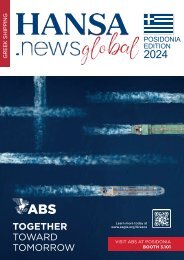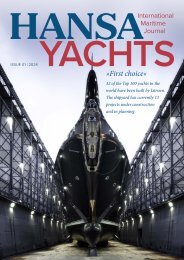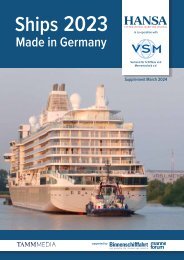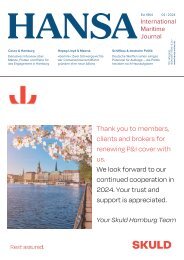HANSA 01-2019
Speditionen | Windantrieb | Tanker-Report | RAVE | Bilanz deutscher Häfen | Hyperloop | Fokus Bunker & Schmierstoffe | Shortsea | dship | Hansa Heavy Lift | Review HANSA-Forum
Speditionen | Windantrieb | Tanker-Report | RAVE | Bilanz deutscher Häfen | Hyperloop | Fokus Bunker & Schmierstoffe | Shortsea | dship | Hansa Heavy Lift | Review HANSA-Forum
Erfolgreiche ePaper selbst erstellen
Machen Sie aus Ihren PDF Publikationen ein blätterbares Flipbook mit unserer einzigartigen Google optimierten e-Paper Software.
Schiffstechnik | Ship Technology<br />
With the IMO 2020 regulation looming on the horizon, the lubricants industry is also faced<br />
with the technical challenge of how to meet with the new stringent regulations. New products<br />
are on the way, writes Samantha Fisk<br />
Trying to get ships cleaner for the future<br />
has hit not just the maritime industry;<br />
but has sent a shock wave over the<br />
globe to its other counter parts and suppliers<br />
in other industries too, none more<br />
so than that of the oil industry, which is<br />
now faced by developing products that<br />
will also be compliant with the latest<br />
regulations coming into affect. The effect<br />
that this is having on the maritime industry<br />
is that there is confusion for most<br />
about what technology will be the best to<br />
invest in, both financially and also that<br />
will definitely meet with environmental<br />
legislation. One of the main factors about<br />
which way shipowners should head in has<br />
been the topic of fuel with recent months<br />
seeing a rapid flurry of speculative new<br />
fuels being developed for the market.<br />
Iain White, global field engineering<br />
manager, ExxonMobil highlights that<br />
there is a lot of confusion in the market<br />
at the moment surround fuel choice and<br />
what shipowners will need to opt for going<br />
into the future. To help its customers<br />
and help the industry, Exxonmobil<br />
launched its »Journey to 2020« series of<br />
symposiums in late 2<strong>01</strong>8.<br />
ExxonMobil on »Journey to 2020«<br />
The first symposium was held at the Equinox<br />
Complex, in Singapore in October,<br />
followed by events in Hong Kong, Taipei,<br />
Athens, Tokyo, Imbari, Copenhagen and<br />
Hamburg. Other dates in 2<strong>01</strong>9 are also<br />
scheduled. The company says that it anticipates<br />
that the vast majority of the industry<br />
will initially choose low sulphur<br />
fuels, there is no single route to compliance.<br />
The »Journey to 2020« symposiums<br />
will enable operators to discuss the most<br />
practical compliance choices for them<br />
with a team of ExxonMobil experts with<br />
deep industry experience and fuels and<br />
lubricants’ knowledge.<br />
These events will also provide an opportunity<br />
for operators to explore cylinder oil<br />
options that best fit their fuel choices. For<br />
the majority of vessels bunkering a 0.50%<br />
sulphur fuel, a 40BN cylinder oil will be<br />
the best choice. Vessels fitted with scrubbers<br />
will continue to burn HFO and will<br />
solely use a high BN alternative.<br />
White highlights that over the recent<br />
years with NO x regulations and EEDI<br />
standard this has impacted the design<br />
of engines coming to the market today,<br />
along with this 50% of ships are lubricated<br />
wrongly, he notes. »In 2<strong>01</strong>1 we saw<br />
the problem with cold corrosion and the<br />
advice was to adjust the feed rate and reduce<br />
the cylinder«, he adds.<br />
ExxonMobil has been developing technologies<br />
to further investigate and understand<br />
how oils are working in the engines.<br />
The company has undertaken a<br />
large investment programme in its facilities<br />
for research in this area, where it now<br />
has facilities to X-ray the oil as it is working<br />
which allows the company to calculate<br />
the iron and base numbers in 20 minutes.<br />
In addition to this ExxonMobil has<br />
launched its Mobil Serv Cylinder Condition<br />
Monitoring Service. The company<br />
says that the scrape down oil analysis<br />
service utilises XRF technology that will<br />
provide operators with rapid, detailed insights<br />
for their engine.<br />
The cylinder condition monitoring service<br />
will allow operators to receive recommendations<br />
on feed rate and cylinder<br />
oil to optimise engine lubricant consumption,<br />
which will allow customers to<br />
react quickly to any situations that may<br />
occur. The monitoring service will also<br />
have the ability to measure the sulphur<br />
content of the vessel’s fuel. Further to<br />
this, ExxonMobil are looking to launch<br />
a new lubricant to the market in 2<strong>01</strong>9 that<br />
will be aimed at the new types of engines<br />
affecting the market.<br />
Total – launch in 2<strong>01</strong>9<br />
Total Lubmarine are also experiencing<br />
similar confusion on the market whilst<br />
the deadline for the IMO 2020 comes<br />
into effect. Serge Dal Farra, Marketing<br />
Director, Total Lubmarine explains the<br />
time that we are currently going through<br />
can be summed up by the term VUCA,<br />
Volatility of the market, Uncertainty of<br />
what lies ahead, Complex decisions and<br />
Ambiguity.<br />
Ihr Einsatz ist<br />
unbezahlbar.<br />
Deshalb braucht<br />
sie Ihre Spende.<br />
www.seenotretter.de<br />
Die Seenotretter_DGzRS_180x75_Version2_4c.indd 1 24.07.14 12:44<br />
<strong>HANSA</strong> International Maritime Journal – 156. Jahrgang – 2<strong>01</strong>9 – Nr. 1 63


















